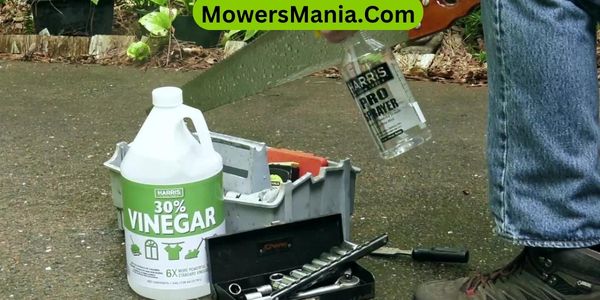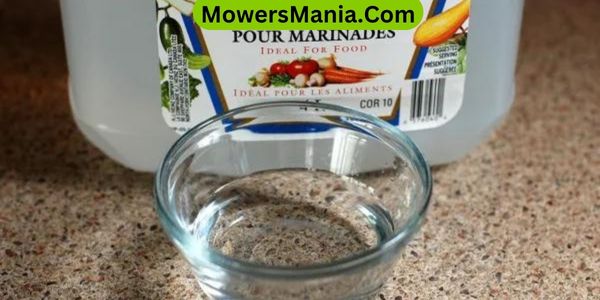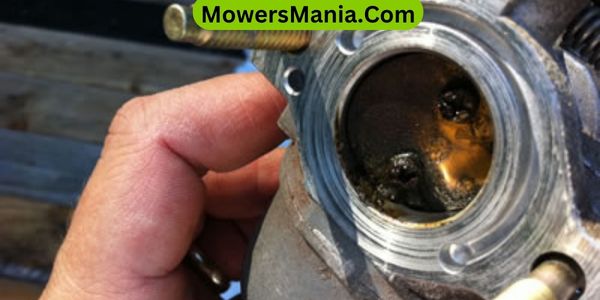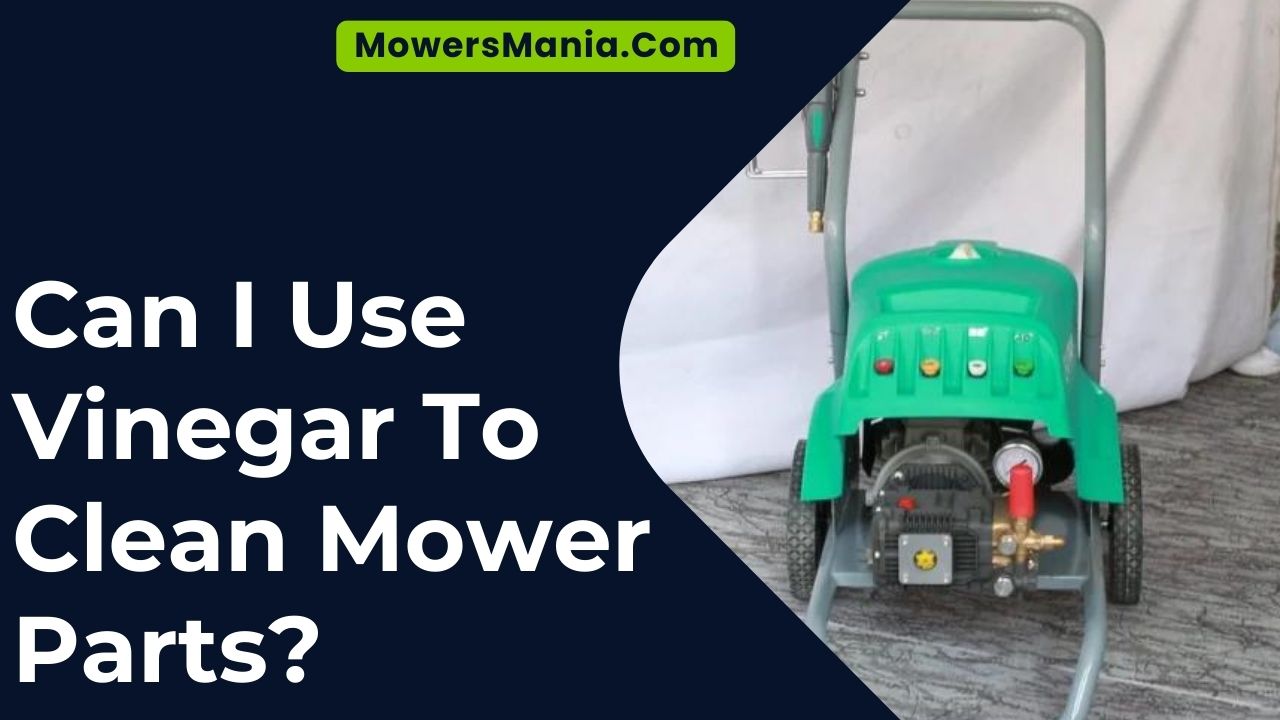Using vinegar for cleaning mower parts has been a topic of interest for many gardeners and DIY enthusiasts. It’s a natural and inexpensive alternative to harsh chemical cleaners, but does it really get the job done?
In this guide, you’ll discover the benefits of using vinegar for cleaning mower parts, the types of parts that can be effectively cleaned, safety precautions to keep in mind, and steps for achieving a thorough clean.

Whether you’re looking to maintain your equipment or simply prefer eco-friendly cleaning solutions, exploring the use of vinegar for mower part cleaning could be a game changer for you.
Benefits of Using Vinegar for Cleaning Mower Parts
You can benefit from using vinegar for cleaning mower parts by effectively removing grease and grime without harsh chemicals.
Vinegar’s acidic nature makes it an excellent natural cleaner for cutting through tough buildup on mower parts.
It’s also a cost-effective alternative to commercial cleaning products, saving you money while still providing powerful cleaning results.
Additionally, vinegar is environmentally friendly, as it doesn’t contain the harmful toxins often found in traditional cleaners. This means you can clean your mower parts without worrying about the negative impact on the environment.
Furthermore, using vinegar for cleaning mower parts is a safer option for you, as it reduces your exposure to potentially harmful chemicals that are present in many commercial cleaning agents.
The versatility of vinegar also allows you to use it for various other cleaning tasks around your home, making it a multipurpose cleaning solution.
Types of Mower Parts That Can Be Cleaned With Vinegar
When considering the application of vinegar for cleaning mower parts, the various components such as blades, engine surfaces, and undercarriage can benefit from its grease-cutting and environmentally friendly properties.
Vinegar is particularly effective for cleaning mower blades. The acidic nature of vinegar helps to dissolve and remove the built-up grass clippings, dirt, and debris that can affect the blade’s cutting efficiency.
Additionally, vinegar can be used to clean engine surfaces. It can help to remove oil and grease buildup, keeping the engine running smoothly.
Furthermore, the undercarriage of the mower can also be cleaned with vinegar. This area tends to accumulate a significant amount of grass clippings, mud, and debris, which can impact the mower’s performance.
Vinegar’s cleaning properties can effectively break down and remove these residues, helping to maintain the undercarriage in good condition.
Safety Precautions When Cleaning Mower Parts With Vinegar

Before you start cleaning mower parts with vinegar, it’s important to be aware of the potential for corrosion.
Make sure to wear gloves, goggles, and a mask to protect yourself from the acidic fumes and potential splashes.
These safety precautions will help ensure a safe and effective cleaning process.
Vinegar Corrosion Risk
To minimize corrosion risk, exercise caution when cleaning mower parts with vinegar. While vinegar is a natural cleaning agent, it’s acidic and can cause corrosion if not used properly.
To prevent this, dilute the vinegar with water before using it to clean mower parts. After cleaning, thoroughly rinse the parts with water and dry them completely to remove any residual vinegar.
Additionally, consider applying a protective coating, such as oil or lubricant, to the parts after cleaning to further reduce the risk of corrosion.
It’s also important to wear gloves and eye protection when handling vinegar to avoid skin and eye irritation.
Personal Protective Equipment Needed
Exercise caution when cleaning mower parts with vinegar and always wear gloves and eye protection to avoid skin and eye irritation. Vinegar is acidic and can cause irritation upon contact with the skin or eyes.
When handling vinegar for cleaning mower parts, protect your hands by wearing rubber gloves that are resistant to acids. Additionally, ensure your eyes are shielded from potential splashes or fumes by wearing safety goggles.
These precautions are crucial for your safety and well-being during the cleaning process. By taking these simple steps, you can minimize the risk of skin irritation and protect your eyes from potential harm.
Prioritizing personal protective equipment when using vinegar for cleaning mower parts is essential to ensure a safe and effective cleaning experience.
Steps for Effectively Cleaning Mower Parts With Vinegar
You should regularly soak mower parts in vinegar to effectively remove grime and rust. Follow these steps for a thorough cleaning:
| Step | Instructions |
|---|---|
| 1 | Disassemble mower parts: Remove blades, filters, and any other removable parts that need cleaning. |
| 2 | Prepare vinegar solution: In a container, mix equal parts water and white vinegar. Submerge the parts in the solution. |
| 3 | Soak the parts: Let the parts soak for at least 30 minutes or longer if the grime or rust is stubborn. |
| 4 | Scrub the parts: Use a brush or scrubbing pad to remove the loosened grime and rust. |
| 5 | Rinse and dry: After scrubbing, rinse the parts with water and dry them thoroughly before reassembling. |
Maintaining Mower Parts After Cleaning With Vinegar
After cleaning with vinegar, continue to regularly lubricate and inspect the mower parts for any signs of rust or wear.
Proper maintenance is crucial to ensure your mower parts remain in good working condition. Apply a thin layer of lubricant to the moving parts such as the blades, axles, and bearings to prevent rust and corrosion. Regular lubrication will also help reduce friction, extending the lifespan of the parts.
Additionally, inspect the parts for any signs of rust, corrosion, or wear. Look for any discoloration, rough spots, or degradation of metal surfaces.
If any issues are found, address them promptly to prevent further damage. It’s important to replace any worn or damaged parts to maintain the overall efficiency and safety of the mower.
Potential Drawbacks of Using Vinegar for Mower Part Cleaning

Regular use of vinegar for cleaning mower parts can lead to corrosion and damage to certain metal components. While vinegar is a versatile and effective cleaner, it can have some drawbacks when used for cleaning mower parts.
Here are some potential drawbacks to consider:
- Corrosion: Vinegar is acidic and can cause metal parts to corrode over time if not properly rinsed and dried.
- Damage to Aluminum: Vinegar can react with aluminum, causing pitting and dulling of the surface.
- Potential for Rust: If not thoroughly rinsed and dried, vinegar residue can lead to the formation of rust on metal parts.
- Effect on Painted Surfaces: Vinegar can strip paint and coatings from metal surfaces, leading to aesthetic damage.
- Odor: The strong smell of vinegar may linger on the mower parts even after cleaning, which can be unpleasant.
Considering these potential drawbacks, it’s important to use vinegar cautiously when cleaning mower parts, especially on metal components. Always ensure thorough rinsing and drying to minimize the risk of corrosion and damage.
Frequently Asked Questions [FAQs]
Can Vinegar Damage or Corrode Certain Types of Mower Parts?
Using vinegar to clean mower parts can potentially damage or corrode certain types of materials, such as rubber or aluminum. It’s important to check the compatibility of vinegar with specific mower parts before using it for cleaning.
Will Using Vinegar for Cleaning Mower Parts Affect the Performance or Longevity of the Parts?
Using vinegar to clean mower parts will not affect performance or longevity as long as you rinse thoroughly. It’s an effective and eco-friendly option. However, avoid using it on certain materials that may be corroded by acidic substances.
Are There Any Specific Types of Vinegar That Are Better or Worse for Cleaning Mower Parts?
For cleaning mower parts, white vinegar is more effective than other types due to its higher acidity. It helps remove rust and grime without damaging the parts. Avoid using balsamic or red wine vinegar as they are less effective.
Can Vinegar Effectively Remove All Types of Buildup or Debris From Mower Parts?
Yes, vinegar can effectively remove all types of buildup or debris from mower parts. It’s a versatile and natural cleaner that can tackle grease, rust, and other residues, leaving your mower parts clean and ready to use.
Is There a Recommended Frequency for Cleaning Mower Parts With Vinegar to Maintain Optimal Performance?
To maintain optimal performance, clean mower parts with vinegar as needed, especially after heavy use or when buildup is visible. There’s no strict frequency, but inspecting and cleaning regularly will help prevent performance issues.
Conclusion
So, next time you need to clean your mower parts, remember that vinegar can be a safe and effective option. Just be sure to follow the safety precautions and proper steps for cleaning to ensure the best results.
With regular maintenance and cleaning using vinegar, you can keep your mower parts in great shape for a long time to come.



